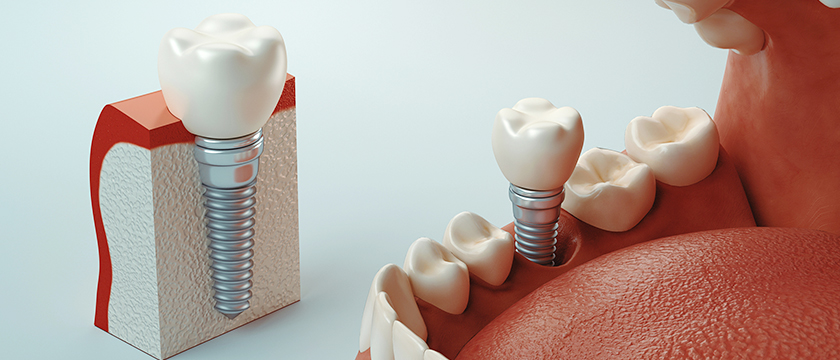 10 Jul 2021
10 Jul 2021
Tooth loss is a common dental condition seen among patients. Losing a tooth to injury, gum disease, or decay can impact your facial appearance and compromise your ability to speak and chew normally. Many people who have lost a tooth worry about it constantly and become self-conscious, afraid to let anyone see the gap in their smile.
Dental implants can be used to replace missing teeth and correct these problems. Many patients report that getting dental implants has had a significant impact on their quality of life. Some forget that they were ever missing a tooth in the first place. Our guide will teach you everything you need to know about dental implants, including what they do, how they are placed, and why they are the right choice to replace your missing tooth.
Why Should You Get Dental Implants?
Dental implants are just one option you have to replace a missing tooth, but they are often the best option.
Compared to dentures, implants stay fixed in place. This means that you can use them just like natural teeth, without any slipping or sensory problems that come with dentures.
Unlike bridges, implants do not require the adjacent teeth to be ground down. This allows you to preserve as much of your natural tooth structure as possible.
However, the other two tooth replacement options are still viable treatments that might offer enough function to suit your needs. Whether implants are right for you depends on:
- Your Health Status. Depending on where the missing tooth is located and how much jawbone you have left in that area, a dental implant may not be your best option. Certain cardiac conditions may also make you a poor candidate for dental implants.
- Your Budget. Dental implants can be costly. For some, there may only be room in the budget for less expensive tooth replacement options.
- Your Preferences. Some people prefer another option to implants, and that is fine. Even if you choose a different solution at first, you may still have an implant placed in the future.
Benefits of Dental Implants
Dental implants have a lot of advantages. Some of their biggest benefits include:
- Increased Comfort. Dental implants stay permanently in place, making them just as comfortable as natural teeth.
- Realistic Appearance. Implants are made from high-quality materials that perfectly mimic the look of natural teeth, right down to their slightly translucent appearance.
- Easier Eating. A dental implant allows you to chew your food just as you would with your original teeth.
- Clear Speech. Dental implants are small, unobtrusive, and stay in place, so they never get in the way of your speech as dentures would.
- Enhanced Durability. No other tooth replacement option typically lasts as long as a dental implant does.
- Convenience. Dental implants can be cleaned and cared for just like regular teeth and do not need to be removed from the mouth.
- Improved Self-Esteem. With a dental implant filling the gap in your teeth, you will have the self-confidence to smile, laugh, and participate fully in life once again.
What Does a Tooth Implant Procedure Include?
Placing a tooth implant is a complex surgical procedure that requires a lot of prep work. Before the procedure, your dentist will perform:
- An Initial Consultation. Before beginning any technical work, your dentist will discuss your case with you. They may ask you questions about how many teeth you want to replace, how long they have been missing, whether you are a smoker and other pertinent information. They may also examine the condition of your other teeth and gums and take scans and x-rays to document the state of your jawbone.
- A Review of Your Medical History. The dental implant procedure carries a lot of the same risks as other surgeries. To make the procedure as safe as possible, your dentist will review your full medical history, including any prescription or over-the-counter drugs you are taking and any health conditions you may have.
- Evaluation Of Your Bone. Next, your dentist will evaluate your jawbone more closely. At this point, they might refer you to get a CT scan of your jaw so they have the exact measurements of the area where the implant will be placed. Depending on the quality and size of the available bone, a graft may be recommended to ensure that there is enough healthy bone for a successful implant.
- Treatment Planning. Finally, your dentist will determine the best way to deliver your treatment. During this process, they will account for individual factors such as the quality of your jawbone, the position of your remaining teeth, and the number of teeth which must be replaced.
Maximizing Your Chance of Success
Because dental implants can fail, it is essential to do everything you can to prevent this outcome. A few of the most helpful steps you can take include:
- Quitting smoking
- Maintaining excellent oral hygiene
- Reducing clenching and grinding behaviours
- Getting bone grafts if your dentist recommends it
- Choosing an experienced dentist with a good reputation for placing implants that last
How Dental Implants Are Placed
When the planning has concluded, treatment can begin. There are five steps involved in placing a dental implant:
- Preparing the Jawbone. Your dentist gets your jawbone ready for implant placement. This may involve removing the remnants of the damaged tooth you wish to replace or performing bone grafts to strengthen the jawbone if it is too weak.
- Placing the Implant. Your dentist will then create an incision in your gums and drill a hole directly into the jawbone beneath it. They will then fill this hole with a securely placed metal post screwed into the bone. At this point, you will still have a space between your teeth, but you may be able to request a temporary partial denture to fill the space while you wait for the site to heal.
- Observing Your Bone Growth. If all goes well, a process called osseointegration will begin. During this process, your jawbone regrows closely around the surface of the screw and attaches itself firmly. This keeps your implant post in place and allows it to act as a tooth root.
- Placing the Abutment. After the screw has been secured, your dentist will reopen your gums and attach the abutment to the metal post in your mouth. They will then seal the gums again, leaving part of the abutment still visible. This is the part that will hold the artificial tooth. Sometimes, the abutment is placed at the same time as the implant.
- Attaching the Tooth. Once your gums have fully healed, your new synthetic tooth will finally be attached, and the implant process will be complete.
Aftercare and Maintenance
It is important to take care of your implant after it has been placed. Be sure to:
- Clean the Implant Like You Would Any Other Tooth. Not only are the gums around your implant still vulnerable to gum disease, but any plaque that builds up around the implant can cause decay in the surrounding natural teeth.
- Minimize the Strain You Put on Your Implant. Do your best not to clench and grind your teeth. Avoid hard foods like candies, olives with pits, ice, and nuts with shells.
- Visit Your Dentist for Regular Checkups. If you are developing any problems with your implant, your dentist will catch them during your routine 6-month checkups. Getting regular dental exams and cleanings also helps prevent gum disease, which will keep your new tooth implant solidly anchored in your jawbone.
What Does a Tooth Implant Cost in Mississauga?
The cost of dental implants in Mississauga is based on many factors, including:
- How many implants are being placed
- Which materials are used
- How complex your case is
- How experienced your dentist is
If you are interested in getting dental implants, ask your dentist for an estimate. They will be happy to tell you what you can expect to pay.
Frequently Asked Questions About Dental Implants
Do Dental Implants Feel Like Natural Teeth?
Dental implants do not have a nerve, so they cannot cause sensitivity or pain the way a real tooth can. Beyond that, however, they look, feel, and function just like a natural tooth does. You should feel no difference when chewing and speaking with an implant than when you had all your original teeth.
Who is Best Qualified to Place Dental Implants?
Not all dentists are equally skilled at placing dental implants, and poor quality work can jeopardize the success of the procedure. For best results, you should choose a specialist dentist who regularly performs tooth implant procedures.
Can a Dental Implant Fall Out?
Technically, yes, but this does not happen often. This is why it is crucial to prevent gum disease and bone loss if you have dental implants in your mouth. A tooth implant is anchored into your jawbone and will stay securely in place as long as it is properly placed and the bone does not degrade.
How Long Does It Take to Recover from a Tooth Implant Procedure?
It could take anywhere from a few days to several weeks to recover from a tooth implant procedure, depending on the number of implants placed, whether any grafts were needed, and your physiology. Complete recovery will take between 4 and 6 months.
How Many Years Do Dental Implants Last?
Dental implants can last a lifetime if they are properly cared for. Many patients keep theirs in place for over 50 years. Be sure to practice good oral hygiene and visit your dentist regularly to make your tooth implant last as long as possible.
Get Quality Dental Implants from the Best Dentist in Mississauga
 Getting dental implants could change your life. Make sure you get the best results by choosing the best dentist for the job. Dr. Tousi and the team of Trillium Smile Dentistry have been working together to place implants for years. Our time-tested dental implant skills allow us to provide exceptional service during this exciting yet challenging procedure.
Getting dental implants could change your life. Make sure you get the best results by choosing the best dentist for the job. Dr. Tousi and the team of Trillium Smile Dentistry have been working together to place implants for years. Our time-tested dental implant skills allow us to provide exceptional service during this exciting yet challenging procedure.
Call us at 905-828-9894 or request an appointment online and ask us about the next steps to getting dental implants for your missing teeth – we know you will be happy with the outcome.
